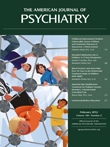Abnormal Thyroid Function Tests in Psychiatric Patients: A Red Herring?
Abstract
Abstract:
Thyroid abnormalities can induce mood, anxiety, psychotic, and cognitive disorders. Thus, thyroid function tests are routinely checked in psychiatric patients. However, up to one-third of psychiatric patients may demonstrate thyroid function test abnormalities that do not reflect true thyroid disease, but rather are a manifestation of secondary effects on one or more levels of the hypothalamic-pituitary-thyroid (HPT) axis. Originally termed the euthyroid sick syndrome, this phenomenon is now more commonly referred to as “non-thyroidal illness.” In psychiatric patients with non-thyroidal illness, patterns of thyroid function test abnormalities may vary considerably based upon factors such as the underlying psychiatric disorder, the presence of substance abuse, or even the use of certain psychiatric medications. Thus, any abnormal thyroid function tests in psychiatric patients should be viewed with skepticism. Given the fact that thyroid function test abnormalities seen in non-thyroidal illness usually resolve spontaneously, treatment is generally unnecessary, and may even be potentially harmful.



